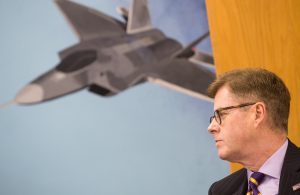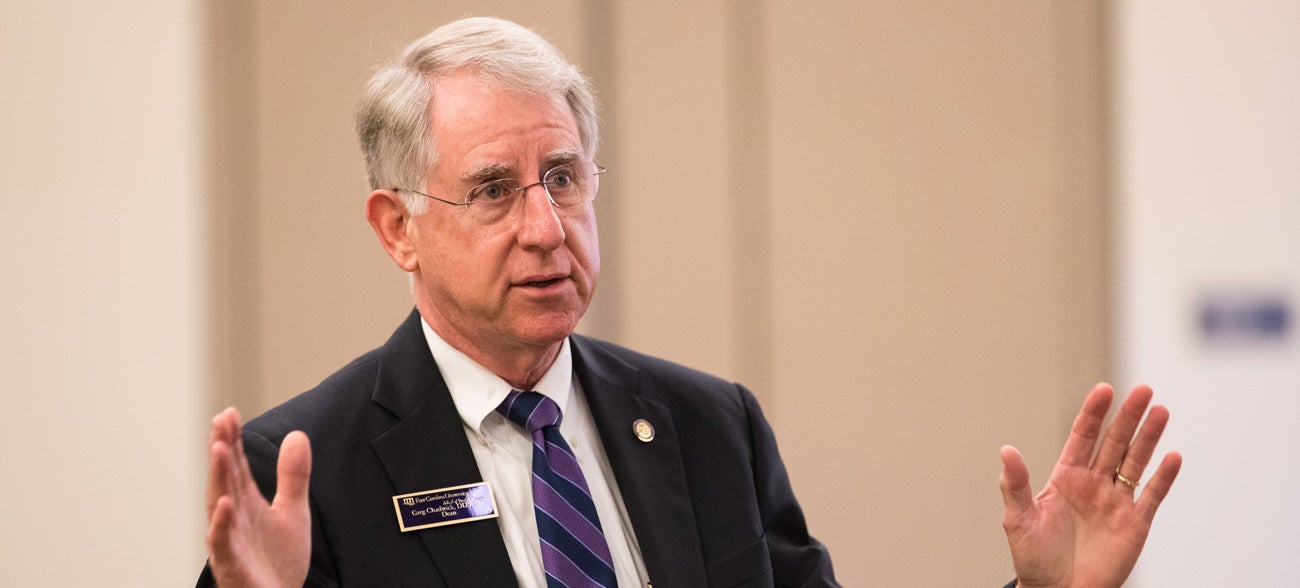TUITION, FEES APPROVED
Student fees increase, undergraduate tuition remains unchanged
Fees but not tuition will increase for in-state East Carolina University undergraduate students during the 2018-19 year.
On Nov. 10, the ECU Board of Trustees approved an increase in fees for all students and tuition increases for dental and physical therapy graduate students following the recommendation of the Finance and Facilities Committee, which met Thursday.
Dental students will pay $1,000 more in tuition, rising from $27,944 to $28,944. The rate is still in the bottom quartile across the nation, said Dr. Rick Niswander, vice chancellor for administration and finance. The additional revenue will be allocated for a full-time epidemiologist/dentist faculty member. The dental school admits 52 students each year from about 400 applicants.
The physical therapy program – which admits 32 students per year – will increase tuition by $1,380 annually. The total cost per year will be $13,699, which is the lowest tuition rate in the state. The increased revenues will provide supervised direct patient contact hours for students in the clinics, support for travel and student research/capstone projects, student leadership development opportunities and to hire a full-time research coordinator/lab manager.
Last fall, UNC system leaders enacted a fixed tuition rate for first-time, full-time, in-state undergraduates and new transfer students who remain enrolled for eight consecutive semesters or the equivalent number of semesters for transfer students. Market-driven increases to out-of-state undergraduate and all graduate students are allowed. In addition, the state capped fee increases at 3 percent on its campuses.
Beginning next fall, all ECU students will pay a total of $45 more in fees per year to support campus recreation and wellness ($20) and student center operations ($25). A proposed new $5 student fee for sustainability – which had been requested and supported by students – failed. The fee would have provided opportunities to use the campus as a living laboratory, giving students a chance to develop valuable skills and obtain real-life experiences while pursuing their education.

Chancellor Cecil Staton and members of the ECU Board of Trustees spoke with ROTC cadets during a campus visit Thursday afternoon.
Max Joyner, chair of the Finance and Facilities Committee, said the fee was first presented to the committee the day prior, and that there was not enough detail about what the fee would be used for and how it would be administered.
Niswander said revenues from the approved fee increases, estimated at $976,500, will support a growing number of club and intramural sport participants as well as the cost of opening two new student centers on campus. The first opened this spring on the health sciences campus and the center on 10th Street is expected to open next fall.
The $25 portion of fees for student center operations is the second of three planned increases. Another is expected for the 2019-20 academic year.
Other changes are for specific programs or activities.
Dental medicine will charge third-year dental students an additional $360 for pre-clinical education materials. Graduate students will pay an additional $25 for orientation fees, and students who don’t show proof of required immunizations will be charged a $100 immunization administrative fee.
In other charges, ECU students will pay more for housing and dining.
Housing will have an average rate increase of 2.6 percent for residence halls. The increases range from $127 to $175 annually depending on the dorm and room type. Total annual rates will range from $4,420 to $8,160. Room rates differ per hall based on facility accommodations.
Dining has proposed an increase of $50 per meal plan, resulting in a 1.32 percent increase, due to the rising cost of food and a reduction in revenues due to the closing of Greene Hall and D360 for renovations and redevelopment.
Parking is proposing a 2 percent increase in all rates, which range from $1 to $11 annually. There are different zoned permit prices based on proximity to campus. In addition, new rates are being proposed for spaces in the garage being built next to the student center under construction on 10th Street.
Parking is self-sustaining; no state funds can be used to maintain parking areas on campus, said Bill Koch, associate vice chancellor of environmental health and campus safety. Parking fees are set in consideration of UNC system schools, the local market and the cost of operation, he said.
In other business:
- The board approved the purchase of the property at 321 E. 10th St. for $900,000. The 0.34-acre property with a 2,280-square-foot commercial building is the site of a FedEx office. The current property owner will be permitted to honor the existing lease, which expires next July.
- The board approved the conferral of degrees for the Dec. 15 commencement ceremony.
- Coach Julie Torbett gave an update on women’s volleyball, whose winning season has made Torbett the winningest volleyball coach in ECU history.
- Athletic Director Jeff Compher noted several other athletic achievements, including the strong showing by the men’s and women’s cross country teams at the recent conference championships as well as track and field’s increasing emphasis on distance running.
- The Southside Renovation Project for Dowdy-Ficklen Stadium continues to move forward and is awaiting construction approval. The UNC Board of Governors has approved a cost increase for the project from $55 million to $60 million. Baseball’s new hitting facility is going through the contract process and is scheduled to start mid-December with a completion date in spring 2018.
- Renderings were presented for the new Life Sciences and Biotechnology Building, a $95 million project funded by the Connect N.C. bond approved by voters in 2016. Located on 10th Street between Evans and Cotanche streets, the project is intended to provide a state-of-the-art facility for science and research, and to serve as a gateway to campus from the new 10th Street connector. Construction is expected to begin in 2019, with occupancy planned for 2021.
- University Advancement Vice Chancellor Christopher Dyba gave an update on fundraising, noting that nearly $12 million has been raised during the last fiscal year, and $155 million has been raised to date toward the university’s forthcoming $500 million comprehensive campaign. Dyba also noted that University Advancement has entered into a contract with the marketing firm 160over90 to help with future campaign branding.
- ECU Alumni Association President Heath Bowman introduced the launch of ECU Connect, an online network aimed at increasing engagement among ECU alumni.
- Chancellor Cecil Staton recognized the service of three employees retiring from the university: Dr. Nicholas Benson, vice dean of the Brody School of Medicine, 34 years of service; Dr. Glen Gilbert, dean of the College of Human Health and Performance, 20 years of service; and Scott Buck, associate vice chancellor for business services, 31 years of service.
The next regular meeting of the ECU Board of Trustees will be held Feb. 15-16, 2018.

Dr. Gregory Chadwick, dean of the ECU School of Dental Medicine, was recognized for receiving the James E. Holshouser, Jr. Award for Excellence in Public Service.
